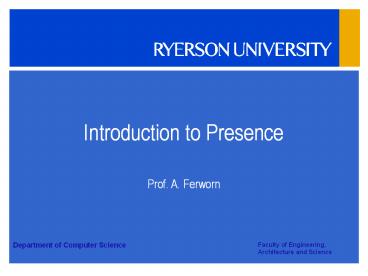Introduction to Presence - PowerPoint PPT Presentation
Title: Introduction to Presence
1
Introduction to Presence
- Prof. A. Ferworn
2
Topics
- Course Management Form
- Assignments
- Buzz words
- Telepresence
- Presence
- Research Questions
- The Gestalt of Presence
- Measuring Presence
3
What is Telepresence?
- Term coined by Marvin Minsky in 1980 but
attributed to the futurist Patrick Gunkel - He meant Manipulation of objects in the real
world through remote access technology
4
Telepresence
5
Example MAX Teleoperated dog on the Web (1998-99)
6
MAX
7
Presence
- Expanded definition of Telepresence by Thomas
Sheridan (1994) - Presence is a theoretical concept describing the
effect that people experience when they interact
with a computer-mediated or computer-generated
environment.
8
What is Presence?
- Sense of being present in an environment
- A physical
- Virtual
- Imagined
- Hallucinated feeling
- Being there is all in your head
- Therefore it is tough to measure
9
Open Research Questions
- Is there a definition of presence that is
sufficiently operational and quantitative to be
useful? - What are the factors that create a sense of
presence? - Are there subjective and objective measures that
can quantify presence?
9
10
More Questions
- Are there applications for which a sense of
presence actually improves operator performance? - Are there applications for which presence is a
necessary ingredient? If so, how are these
applications different from applications for
which a more traditional display system is just
as effective?
10
11
Sheridan (1992)
Sensory Information
- Physical aspects of an experience that determine
presence - What Sensory data is available and how much?
- Can the sensors be controlled?
- Can the environment be modified?
Ability to Modify Environment
Control of Sensors
11
12
Why is Presence applicable to Robotics
- One of definition of the word robot might be
- Any device that supports
- Sensing
- Actuation, and
- Control
Sensory Information
Ability to Modify Environment
Control of Sensors
13
How do we measure presence?
- Well, it turns out, not very well
- Subjective Measurements
- Questionnaires soliciting opinion about
experience - Indirect Psychological Measurements
- Relate stimulus magnitude to opinion about the
stimulus magnitude - Objective Measurements
- Based on
- Performance measures of tasks
- Physiological responses
14
Questionnaires
- Example
- Witmer and Singer Questionnaire
- Questions about reactions to virtual environments
- Hope to create consistency across systems
- General Approach among questionnaires
- Take assumptions about what presence is and make
up questions concerning the assumptions
15
Immersive Tendency Questionnaire
16
Virtual Environment-Centric
17
Physiological Responses
- Theory
- The real world changes our physiological
responses to it. - A remote or virtual world should do the same if
we are immersed in it. - Cardiovascular, Respiratory,
- Nervous, Sensory,
- Blood Chemistry
18
Measure this
- Relax
- Find your Pulse
- Watch this
19
Performance measures
- Success vs. failure measures
- Based on individual task performance
- Eg Bottle tests for teleoperation (next slide)
- Suspension of belief
- Observable changes in mode of behavior relative
to interface - Forgetting the interface is there.
- Instinctual responses
- Ducking at approaching objects
- Leaning into a perceived curve
- Vocalizations
19
20
The Bottle Test
- While testing for presence is hit and miss,
testing for other things can be quite easy - This is the poor mans testing strategy
- When you have nothing else, you can test an
operators concentration and ability to focus
with a simple bottle of water
21
The Bottle Test
22
Example Simulated Rollercoaster
23
How to Measure the Presence
- Subjective Measure
- Questionnaire concerning feeling before and after
ride - Indirect Psychological
- Perceived speed of ride vs. stimulus producing
this perception - Physiological
- Heart rate during ride
24
How would you measure these?
25
Some Heuristics for Presence
- Everyone brings their own state of mind (Gestalt)
to a situation. - There is a large difference between the intensity
of actually being there and being virtually or
distantly there. - perceptions and behavior of and in real-world
situations may be modified based on virtual or
mediated experiences - Presence is consequence free
26
Where is presence important?
- Entertainment
- Training
- Education
- Therapy
- Pain control
- Rehabilitation
26
27
Remember what I said about Gestalt































